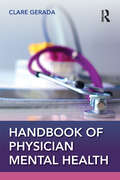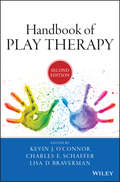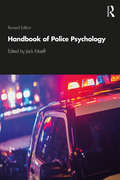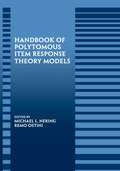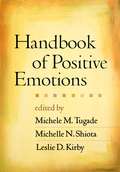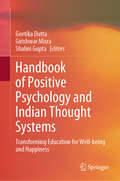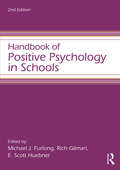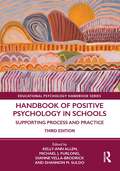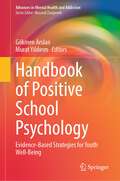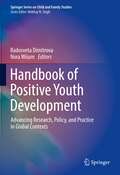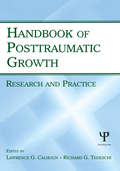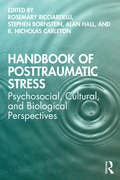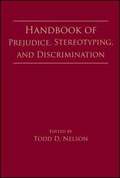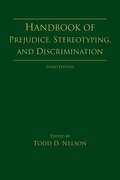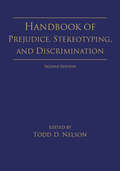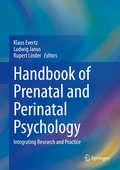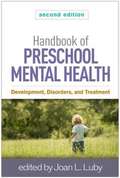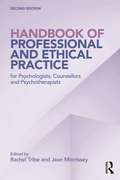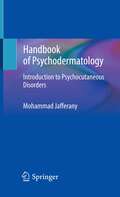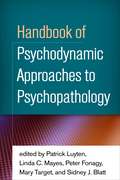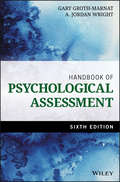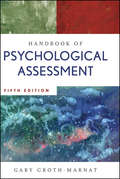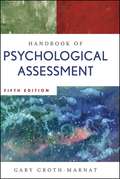- Table View
- List View
Handbook of Physician Mental Health
by Clare GeradaThis definitive textbook on Practitioner Health mixes academic rigour with practitioner and patient experiences. The book covers all aspects of care relevant to any regulated health professional, focusing on the care of doctors and nurses with mental illness. The book builds on themes introduced in the award-winning publication Beneath the White Coat: Doctors, Their Minds and Mental Health from the same author. It provides an invaluable ‘how to manage’ companion to supplement and enhance the broader issues relating to doctors and mental illness addressed in that first book.Key Features Creates a thorough framework on how to assess a health professional with mental illness Includes evidence-based guidance on the diagnosis and management of common mental health problems in health professionals Supports an understanding of how the workplace affects mental health and how mental health affects work in the context of doctors working in a variety of settings Provides an understanding of the regulatory framework governing different health professionals Offers practical advice and guidance on primary prevention measures, including ‘how to spot doctors in distress’, ‘how to approach a doctor colleague to express concern’ and ‘how time and space can be developed within a department to address stress and burnout’ Drawing together 15 years of expertise in caring for more than 30,000 doctors with mental illness, the book is relevant to any health professional working in clinical practice and will be essential reading for those who regulate, appraise, train and support health practitioners across various disciplines.
Handbook of Play Therapy
by Lisa D. Braverman Kevin J. O'Connor Charles E. SchaeferA complete, comprehensive play therapy resource for mental health professionals Handbook of Play Therapy is the one-stop resource for play therapists with coverage of all major aspects written by experts in the field. This edition consolidates the coverage of both previous volumes into one book, updated to reflect the newest findings and practices of the field. Useful for new and experienced practitioners alike, this guide provides a comprehensive introduction and overview of play therapy including, theory and technique, special populations, nontraditional settings, professional and contemporary issues. Edited by the founders of the field, each chapter is written by well-known and respected academics and practitioners in each topic area and includes research, assessment, strategies, and clinical application. This guide covers all areas required for credentialing from the Association for Play Therapy, making it uniquely qualified as the one resource for certification preparation. Learn the core theories and techniques of play therapy Apply play therapy to special populations and in nontraditional settings Understand the history and emerging issues in the field Explore the research and evidence base, clinical applications, and more Psychologists, counselors, marriage and family therapists, social workers, and psychiatric nurses regularly utilize play therapy techniques to facilitate more productive sessions and promote better outcomes for patients. Handbook of Play Therapy provides the deep, practical understanding needed to incorporate these techniques into practice.
Handbook of Police Psychology
by Jack KitaeffThe Handbook of Police Psychology features contributions from over 30 leading experts on the core matters of police psychology. The collection surveys everything from the beginnings of police psychology and early influences on the profession; to pre-employment screening, assessment, and evaluation; to clinical interventions. Alongside original chapters first published in 2011, this edition features new content on deadly force encounters, officer resilience training, and police leadership enhancement. Influential figures in the field of police psychology are discussed, including America’s first full-time police psychologist, who served in the Los Angeles Police Department, and the first full-time police officer to earn a doctorate in psychology while still in uniform, who served with the New York Police Department. The Handbook of Police Psychology is an invaluable resource for police legal advisors, policy writers, and police psychologists, as well as for graduates studying police or forensic psychology.
Handbook of Polytomous Item Response Theory Models
by Michael L. Nering Remo OstiniThis comprehensive Handbook focuses on the most used polytomous item response theory (IRT) models. These models help us understand the interaction between examinees and test questions where the questions have various response categories. The book reviews all of the major models and includes discussions about how and where the models originated, conceptually and in practical terms. Diverse perspectives on how these models can best be evaluated are also provided. Practical applications provide a realistic account of the issues practitioners face using these models. Disparate elements of the book are linked through editorial sidebars that connect common ideas across chapters, compare and reconcile differences in terminology, and explain variations in mathematical notation. These sidebars help to demonstrate the commonalities that exist across the field. By assembling this critical information, the editors hope to inspire others to use polytomous IRT models in their own research so they too can achieve the type of improved measurement that such models can provide. Part 1 examines the most commonly used polytomous IRT models, major issues that cut across these models, and a common notation for calculating functions for each model. An introduction to IRT software is also provided. Part 2 features distinct approaches to evaluating the effectiveness of polytomous IRT models in various measurement contexts. These chapters appraise evaluation procedures and fit tests and demonstrate how to implement these procedures using IRT software. The final section features groundbreaking applications. Here the goal is to provide solutions to technical problems to allow for the most effective use of these models in measuring educational, psychological, and social science abilities and traits. This section also addresses the major issues encountered when using polytomous IRT models in computerized adaptive testing. Equating test scores across different testing contexts is the focus of the last chapter. The various contexts include personality research, motor performance, health and quality of life indicators, attitudes, and educational achievement. Featuring contributions from the leading authorities, this handbook will appeal to measurement researchers, practitioners, and students who want to apply polytomous IRT models to their own research. It will be of particular interest to education and psychology assessment specialists who develop and use tests and measures in their work, especially researchers in clinical, educational, personality, social, and health psychology. This book also serves as a supplementary text in graduate courses on educational measurement, psychometrics, or item response theory.
Handbook of Positive Emotions
by Barbara L. Fredrickson Michele M. Tugade Leslie D. Kirby Michelle N. ShiotaThis authoritative handbook reviews the breadth of current knowledge about positive emotions: their nature, functions, and consequences for individuals and society. Specific emotions are analyzed in depth, including happiness, pride, romantic love, compassion, gratitude, awe, challenge, and hope. Major theoretical perspectives are presented and cutting-edge research methods explained. The volume addresses neurobiological and physiological aspects of positive emotions as well as their social and intrapersonal contexts. Implications for physical health, coping, and psychopathology are explored, as are connections to organizational functioning and consumer behavior.
Handbook of Positive Psychology and Indian Thought Systems: Transforming Education for Well-being and Happiness
by Girishwar Misra Geetika Dutta Shalini GuptaThis handbook explores the intersection of positive psychology and Indian thought systems in education to create a generation of future citizens who are not only well-educated but also happy and well-rounded. It discusses mental hygiene, well-being, flow, resilience, gratitude, happiness, mindfulness, and happiness curriculum. With contributions from esteemed scholars and practitioners, this book offers comprehensive coverage of positive psychology, Indian thought systems, and their applications in education. It bridges the gap between theory and practice, providing readers with the knowledge and tools to create positive educational experiences that promote well-being, resilience, and happiness. The book is a valuable academic resource for practitioners and students in psychology, educational psychology and education. It is also helpful for parents, educators and anyone interested in promoting well-being and eternal happiness in our educational institutions and society.
Handbook of Positive Psychology in Schools: Supporting Process And Practice (Educational Psychology Handbook)
by Michael J. Furlong Rich Gilman E. Scott HuebnerUnderstanding the factors that encourage young people to become active agents in their own learning is critical. Positive psychology is one lens that can be used to investigate the factors that facilitate a student’s sense of agency and active school engagement. In the second edition of this groundbreaking handbook, the editors draw together the latest work on the field, identifying major issues and providing a wealth of descriptive knowledge from renowned contributors. Major topics include: the ways that positive emotions, traits, and institutions promote school achievement and healthy social and emotional development; how specific positive-psychological constructs relate to students and schools and support the delivery of school-based services; and the application of positive psychology to educational policy making. With thirteen new chapters, this edition provides a long-needed centerpiece around which the field can continue to grow, incorporating a new focus on international applications of the field.
Handbook of Positive Psychology in Schools: Supporting Process and Practice (Educational Psychology Handbook)
by Kelly-Ann AllenThe Handbook of Positive Psychology in Schools offers the most current and comprehensive insights into how positive psychology principles provide a framework for young people to become active agents in their own learning. The third edition of this groundbreaking volume assembles the latest global research identifying fundamental assets—hope, optimism, gratitude, self-efficacy, emotional regulation, among others—that support students’ learning and well-being. Chapters examining social-ecological perspectives on classroom quality and school climate provide best practice guidance on schoolwide policies and practices. These 35 new chapters explore positive psychology’s ongoing influence and advances on prevention, intervention, and assessment practices in schools.
Handbook of Positive Psychology, Religion, and Spirituality
by Everett L. Worthington Edward B. Davis Sarah A. SchnitkerThis handbook aims to bridge the gap between the fields of positive psychology and the psychology of religion and spirituality. It is the authoritative guide to the intersections among religion, spirituality, and positive psychology and includes the following sections: (1) historical and theoretical considerations, (2) methodological considerations, (3) cultural considerations, (4) developmental considerations, (5) empirical research on happiness and well-being in relation to religion and spirituality, (6) empirical research on character strengths and virtues in relation to religion and spirituality, (7) clinical and applied considerations, and (8) field unification and advancement. Leading positive psychologists and psychologists of religion/spirituality have coauthored the chapters, drawing on expertise from their respective fields. The handbook is useful for social and clinical scientists, practitioners in helping professions, practitioners in religious and spiritual fields, and students of psychology and religion/spirituality.This is an open access book.
Handbook of Positive School Psychology: Evidence-Based Strategies for Youth Well-Being (Advances in Mental Health and Addiction)
by Gökmen Arslan Murat YıldırımStudents spend significantly more time in school compared to any other formal institution during their lives; therefore, mental health in schools has attracted a lot of attention in recent years. According to Seligman et al. (2009), positive psychology in school is a response to the gap between what people want for their children and what schools teach. That is, most parents want their children to be happy, healthy, and confident, but schools only focus on achievement, discipline, and academic skills. These are of course important, but so are positive mental health outcomes. To fix this gap, schools must teach achievement and accomplishment along with positive psychology-informed mental health skills. In other words, positive education aims to bring positive psychology’s goals of well-being and mental health support for everyone into the school setting.Psychological interventions have been around in schools since at least the 1930s. Therefore, it makes sense to supplement the already-existing traditional psychology in schools with positive psychology. In the field of psychology, positive psychology interventions are defined as those aimed at raising positive feelings, positive thoughts, and positive behaviour and increasing well-being. Positive Psychology Interventions in schools have been shown to improve mental health and well-being outcomes for students. Recent research has confirmed the same results, as offering emotional support early in a school year can lead to improved instructional quality later in that school year. In other words, positive school psychology interventions offer a focus on mental health in order to set the stage and give students the opportunity for academic achievement. Since the beginning of the positive psychology movement, the application of its assumptions in schools has been one of the movement’s main pillars. The objective of the book is to help counsellors, teachers, and school leaders engage in a positive psychology research-based practice in schools.
Handbook of Positive Youth Development: Advancing Research, Policy, and Practice in Global Contexts (Springer Series on Child and Family Studies)
by Radosveta Dimitrova Nora WiiumThis handbook examines positive youth development (PYD) in youth and emerging adults from an international perspective. It focuses on large and underrepresented cultural groups across six continents within a strengths-based conception of adolescence that considers all youth as having assets. The volume explores the ways in which developmental assets, when effectively harnessed, empower youth to transition into a productive and resourceful adulthood. The book focuses on PYD across vast geographical regions, including Europe, Asia, Africa, Middle East, Australia, New Zealand, North America, and Latin America as well as on strengths and resources for optimal well-being. The handbook addresses the positive development of young people across various cultural contexts to advance research, policy, and practice and inform interventions that foster continued thriving and reduce the chances of compromised youth development. It presents theoretical perspectives and supporting empirical findings to promote a more comprehensive understanding of PYD from an integrated, multidisciplinary, and multinational perspective.The Handbook of Positive Youth Development in a Global Context is an essential resource for researchers, professors, and graduate students as well as clinicians, therapists, and other professionals in developmental, clinical child, and school psychology, public health and prevention science, family studies, cross-cultural psychology, child and adolescent psychiatry, social work, educational policy and politics, anthropology, sociology, social psychology and all interrelated disciplines.
Handbook of Posttraumatic Growth: Research and Practice
by Lawrence G. Calhoun and Richard G. TedeschiPosttraumatic growth is an area in which investigations are now being undertaken in many different parts of the world. The view that individuals can be changed--sometimes in radically good ways--by their struggle with trauma is ancient and widespread. However, the systematic focus by scholars and clinicians on the possibilities for growth from the struggle with crisis is relatively recent. There are now a growing number of studies and scholarly papers on the antecedents, correlates, and consequences of posttraumatic growth, and there are also theoretical models that can help guide the research further. It is clear, however, that this phenomenon is not yet well understood.The Handbook of Posttraumatic Growth: Research and Practice provides both clinicians and researchers with a comprehensive and up-to-date view of what has been done so far. In addition, it uses the foundations of what has been done to provide suggestions for the next useful steps to take in understanding posttraumatic growth. The book offers contributions of important and influential scholars representing a wide array of perspectives of posttraumatic growth. This volume serves as an impetus for additional work, both in the academic aspects and in the possibilities for clinical applications of posttraumatic growth.This Handbook will appeal to students, practitioners, and researchers working in a broad array of disciplines and human services.
Handbook of Posttraumatic Stress: Psychosocial, Cultural, and Biological Perspectives
by Rosemary RicciardelliThe Handbook of Posttraumatic Stress provides a comprehensive review of posttraumatic stress in its multiple dimensions, analyzing causation and epidemiology through prevention and treatment. Written by a diverse group of scholars, practitioners, and advocates, the chapters in this book seek to understand the history, the politics, and the biological, psychological, and social processes underlying posttraumatic stress disorder (PTSD). Featuring studies that focus on some of the most seriously affected occupational groups, the text examines topics such as how individuals experience PTSD in different work settings and the complexities of diagnosis, treatment, and recovery for those workers and their families. Together, the contributions provide an in-depth examination of the current understood causes, impacts, and treatments of and for posttraumatic stress, mobilizing academic, administrative, and clinical knowledge, and lived experience to inform ongoing and future work in the field. Drawing from range of different topics, fields of study, and research methods, this text will appeal to readers across medical, mental health, and academic disciplines.
Handbook of Prejudice, Stereotyping, and Discrimination
by Todd D. NelsonThis handbook provides a comprehensive and scholarly overview of the latest research on prejudice, stereotyping and discrimination. It includes sections on cognitive, affective, and neurological processes, followed by chapters on some of the main target groups of prejudice.
Handbook of Prejudice, Stereotyping, and Discrimination
by Todd D. NelsonThis new edition of this bestselling handbook offers a comprehensive and scholarly overview of the latest research on prejudice, stereotyping, and discrimination.Now in its third edition, the book provides a full update of its highly successful predecessor and features new material on topics such as antisemitism, mental illness stigma, sexual and gender identity prejudice, anti-fat prejudice, politics and prejudice, ableism, evolutionary theory and prejudice, and anti-immigration prejudice. The book is divided into four main parts that consider the origins of prejudice; cognitive, affective, and motivational processes in prejudice; targets of prejudice and reducing prejudice. The volume is written by eminent researchers who explore topics by presenting an overview of current and cutting-edge research and, where appropriate, developing new theory, models, or scales.Handbook of Prejudice, Stereotyping, and Discrimination is an essential text for graduate students, instructors and researchers in social and personality psychology. It is also an invaluable reference for academics and professionals in sociology, communication studies and the social sciences, as well as government workers and policymakers.
Handbook of Prejudice, Stereotyping, and Discrimination: 2nd Edition
by Todd D. NelsonThis Handbook is a comprehensive and scholarly overview of the latest research on prejudice, stereotyping, and discrimination. The Second Edition provides a full update of its highly successful predecessor and features new material on key issues such as political activism, economic polarization, minority stress, same-sex marriage laws, dehumanization, and mental health stigma, in addition to a timely update on how victims respond to discrimination, and additional coverage of gender and race. All chapters are written by eminent researchers who explore topics by presenting an overview of current research and, where appropriate, developing new theory, models, or scales. The volume is clearly structured, with a broad section on cognitive, affective, and neurological processes, and there is inclusion of studies of prejudice based on race, sex, age, sexual orientation, and weight. A concluding section explores the issues involved in reducing prejudice. The Handbook is an essential resource for students, instructors, and researchers in social and personality psychology, and an invaluable reference for academics and professionals in sociology, communication studies, gerontology, nursing, medicine, as well as government and policymakers and social service agencies.
Handbook of Prenatal and Perinatal Psychology: Integrating Research and Practice
by Klaus Evertz Ludwig Janus Rupert LinderThe handbook synthesizes the comprehensive interdisciplinary research on the psychological and behavioral dimensions of life before, during, and immediately after birth. It examines how experiences during the prenatal period are associated with basic physiological and psychological imprints that last a lifetime and explores the ways in which brain networks reflect these experiences. Chapters offer findings on prenatal development, fetal programming, fetal stress, and epigenetics. In addition, chapters discuss psychotherapy for infants – before, during, and after birth – as well as prevention to promote positive health and well-being outcomes. Topics featured in this handbook include:Contemporary environmental stressors and adverse pregnancy outcomesThe psychology of newborn intensive care.Art therapy and its use in treating prenatal trauma.The failures and successes of Cathartic Regression Therapy.Prenatal bonding and its positive effects on postnatal health and well-being.The role of family midwives and early prevention.The cultural meaning of prenatal psychology. The Handbook of Prenatal and Perinatal Psychology is an essential resource for researchers, clinicians and related professionals, as well as graduate students in a wide range of interrelated disciplines, including developmental psychology, pediatric and obstetrical medicine, neuroscience, infancy and early child development, obstetrics and gynecology, nursing, social work, and early childhood education.
Handbook of Preschool Mental Health, Second Edition: Development, Disorders, and Treatment
by Joan L. LubyComprehensively exploring the development of psychiatric disorders in 2- to 6-year-olds, this authoritative handbook has been thoroughly revised to incorporate important scientific and clinical advances. Leading researchers examine how behavioral and emotional problems emerge and can be treated effectively during this period of rapid developmental and brain changes. Current knowledge is presented on conduct disorders, attention-deficit/hyperactivity disorder, anxiety disorders, depressive disorders, autism spectrum disorder, attachment disorders, and sleep disorders in very young children. The volume reviews a range of interventions for preschoolers and their caregivers--including clear descriptions of clinical techniques--and discusses the strengths and limitations of the empirical evidence base. New to This Edition *Many new authors; extensively revised with the latest research and empirically supported treatments. *Heightened focus on brain development and the neural correlates of disorders. *Section on risk and resilience, including chapters on sensitive periods of development and the early environment. *Chapters on parent-child interaction therapy, cognitive-behavioral therapies, attachment-based therapies, and translational approaches to early intervention.
Handbook of Professional and Ethical Practice for Psychologists, Counsellors and Psychotherapists
by Rachel Tribe Jean MorrisseyCloser regulation of psychological counselling means that an awareness of the professional, legal and ethical considerations is vital. The second edition of Handbook of Professional and Ethical Practice offers a clear, stimulating, and structured introduction to a number of contemporary issues of professional and ethical practice. Rachel Tribe and Jean Morrissey have brought together updated, re-written and new contributions from professionals in the interrelated fields of psychology, psychotherapy and counselling, which illustrate the professional and ethical dilemmas involved in mental health practice. Academic and clinical experiences are skilfully combined with personal reflection to produce a comprehensive resource that addresses challenges that therapeutic practitioners are faced with on a daily basis. Each chapter places particular emphasis on the current codes of practice and ethical principles underpinning safe ethical practice and the implications for practitioners. Comprehensive coverage of the legal, clinical and ethical considerations involved in research and training is provided and the reflective questions at the end of every chapter serve to prompt further discussion of the issues. Chapters are enhanced by clinical vignettes that illustrate the particular issues at hand, as well as detailed bibliographies that point the reader towards the latest literature on the subject. The book is divided into 5 sections: Professional practice and ethical considerations Legal considerations and responsibilities Clinical considerations and responsibilities Working with diversity – professional practice and ethical considerations Research Supervision and Training This new, updated edition reflects the changes in the environment in which therapists and psychologists work. Covering a wide range of perspectives, clinical settings and client populations, Handbook of Professional and Ethical Practice 2nd edition will be an invaluable source of both information and inspiration to psychologists, counsellors, psychotherapists and practitioners of diverse orientations and stages of professional development and to those interested in a contemporary, multi-disciplinary approach to best practice in mental health.
Handbook of Psychiatric Disorders in Adults in the Primary Care Setting (Current Clinical Practice)
by Robert Hudak Jessica M. GannonSince psychiatric training in medical school is brief in duration (often 4-8 weeks only), and minimal to nonexistent in many residency programs, most primary care physicians are not adequately equipped to treat psychiatric disorders, despite the fact that this role promises a significant portion of the average physician’s practice. This book provides non-psychiatric physicians, especially primary care physicians, with the tools to successfully diagnose and treat psychiatric disorders in their practices. Primary care physicians are the largest prescribers of psychiatric medications in the US, where they also provide the bulk of psychiatric diagnoses and treatment, especially in traditionally underserved areas. Every chapter is devoted to each of the major psychiatric disorders that a primary care physician is likely to encounter in clinical practice. They are formatted in a nearly identical way to make the text both easy to read and quickly peruse as a reference. Each chapter also includes a clinical description of the disorder, the proper method (including questions to ask, or screening tools, etc.) to make an accurate diagnosis, and differential diagnoses to consider. Additionally, appropriate treatment(s) for the diagnoses are indicated in a stepwise fashion. Chapters also contain information on medical tests that may be appropriate to order to rule out medical conditions, as well as details on proper routine health screening for individuals on specific medications and/or mental health diagnoses. To optimize accessibility of medication prescribing information, several tables of the medications that are commonly prescribed for each disorder will be indicated. This may lead to some redundancy of information, as there is considerable overlap in medication and dosing strategies for different illnesses, ex antipsychotics for bipolar disorder and schizophrenia and antidepressants for Major Depressive Disorder and Anxiety Disorders. However, duplication of information assists in readability and user friendliness, as doctors will not have to flip through different parts of a book or refer to an appendix every time they wish to look up specific medication related information. Written by experts in the field, Handbook of Psychiatric Disorders in Adults in the Primary Care Setting is a valuable resource to aid in the proper assessment and treatment of psychiatric disorders by the physicians who are most likely to see and treat these patients. Most psychiatric textbooks are probably not appropriate for most primary care physicians as they contain far too much specialized information that they do not need to know and do not often contain clinical steps and guidelines for treatment. This text fulfills a pressing clinical need.
Handbook of Psychodermatology: Introduction to Psychocutaneous Disorders
by Mohammad JafferanyThis book provides valuable information to increase confidence in proper, effective management of patients with psychodermatolic conditions. Patients with psychocutaneous disease may present to multiple professionals to seek care. The multidimensional nature of the conditions can lead to specialists being fearful of how to properly manage patients. With the information provided in this book, healthcare providers can increase their comfort and become less hesitant when making decisions determining the proper treatment course and assessing the need for referral. Due to the cross-disciplinary nature of this topic, this book will have a large target audience: Healthcare providers from multiple diverse fields such as, but not limited to, family medicine, dermatology, and psychiatry.Dermatologists, Psychiatrists, general practitioners, dermatology and psychiatry residents, physician’s assistants, nurses, psychologists, and medical students with exposure to patients with psychocutaneous conditions and/or a special interest in the field may also benefit from the presented material. Professors, educators, and researchers with an interest in psychodermatology or interdisciplinary medicineThe Handbook of Psychodermatology will be a powerful resource as an aid in creating coursework material for undergraduate medical students specifically for psychiatry and/or dermatology lectures. In addition, it will be useful to graduate medical education teams creating curriculums for incoming residents in psychiatry, dermatology, family medicine, and pediatrics
Handbook of Psychodynamic Approaches to Psychopathology
by Peter Fonagy Mary Target Linda C. Mayes Patrick Luyten Sidney J. BlattAuthoritative and comprehensive, this volume provides a contemporary psychodynamic perspective on frequently encountered psychological disorders in adults, children, and adolescents. Leading international authorities review the growing evidence base for psychoanalytic theories and therapeutic models. Chapters on each disorder examine its etiology and psychological mechanisms, discuss diagnostic issues, and thoroughly describe effective treatment strategies. Highly accessible, the book is richly illustrated with clinical case material. It demonstrates ways in which psychodynamic theory and therapy are enhanced by integrating ideas and findings from neuroscience, social and personality psychology, cognitive-behavioral therapy, and other fields.
Handbook of Psychological Assessment
by Gary Groth-Marnat A. Jordan WrightOrganized according to the sequence mental health professionals follow when conducting an assessment, this classic resource covers principles of assessment, evaluation, referral, treatment planning, and report writing. Written in a practical, skills-based manner, the sixth editionprovides guidance on the most efficient methods for selecting and administering tests, interpreting assessment data, how to integrate test scores and develop treatment plans as well as instruction on ways to write effective, client-oriented psychological reports. The latest edition provides through coverage of the most commonly used assessment instruments including the Wechsler Intelligence Scales, Wechsler Memory Scales, Minnesota Multiphasic Personality Inventory, Personality Assessment Inventory, Millon Clinical Multiaxial Inventory, NEO Personality Inventory, Rorschach, Thematic Apperception Test, and brief assessment instruments for treatment planning, monitoring, and outcome assessment. In addition, this sixth edition includes: Fully updated with new research and the DSM-5 and ICD-10 New chapter on the NEO Personality Inventory-3. The NEO inventories provide a comprehensive assessment of adult and adolescent personality based on the strongly empirically supported Five Factor Model of personality. New chapter on the Personality Assessment Inventory (PAI), which has gained both strong empirical support and wide clinical popularity. Includes updated information on the newly developed Wechsler Intelligence Scale for Children, Fifth Edition (WISC-V). The chapter on the Minnesota Multiphasic Personality Inventory includes coverage of both the MMPI-2 and the MMPI-2-Restructured Form (MMPI-2-RF) The chapter on the Rorschach discusses both the Comprehensive System and the Rorschach Performance Assessment System (R-PAS). The "Use with Diverse Groups" sections reflect the more extensive use of assessment for a wide variety of populations and the importance of competently and sensitively working with diverse populations. Greater emphasis on making assessment more user friendly and consumer oriented. This is reflected in suggestions for using everyday language in reports, connecting interpretations to actual client behavior, strategies for wording interpretations in a manner likely to enhance client growth, and the importance of collaborating with clients. The treatment planning and clinical decision making chapter has been completely updated, and the psychological report writing chapter has been updated to include the American Psychological Association and Society for Personality Assessment's current thinking about proficiency in personality assessment.
Handbook of Psychological Assessment (3rd edition)
by Gary Groth-MarnatThe Handbook of Psychological Assessment, Third Edition offers busy professionals and graduate students a complete review of today's most commonly used psychological assessment tests.
Handbook of Psychological Assessment (5th Edition)
by Gary Groth-MarnatThis fifth edition reflects the more extensive use of psychological assessment for a wide variety of populations and the importance of working sensitively with diverse populations.
